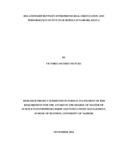| dc.description.abstract | The effects of Entrepreneurial Orientation (EO) on company execution are not always the same, importantly; the different components of EO may have differential impacts on performance of a firm. Consider first risk taking, greater corporate risk taking is usually associated in hotel firms with enhanced company performance. The standard view is that hazard taking is one of the three key components of EO, and one that improves organization gainfulness. The motivation behind the study was to set up the relationship between entrepreneurial introduction and execution of five star lodgings in Nairobi. The study utilized a clear research outline to build up the relationship between entrepreneurial introduction and execution of five star inns in Nairobi, Kenya in light of the exploration objective. The objective populace of this study involved every one of the five star lodgings situated in Nairobi County. The objective populace was the general directors and different heads of key offices which involved Business advancement; human asset; system and business; fund and quality affirmation. The information was gathered from the general administrators and leaders of the offices. Essential information was gathered through an organized survey that was regulated to the general chiefs and leaders of the offices in the 22-five star hotels in Nairobi. The questionnaire had closed ended questions. The senior managers were selected through a census method in the 22- five star hotels in Nairobi. These respondents were better placed in providing required data because they played a leading role in ensuring that they positioned the organization favorably within the dimensions of entrepreneurial orientation. The questionnaires were administered through face -to- face to allow for further probing. The questionnaires were then be picked later by the research assistant. The research was quantitative in nature. Descriptive statistics technique used quantitative analysis to analyze the findings from the structured questionnaire. The descriptive statistics comprised of means and standard deviation measure for the close ended questions. Inferential statistics made use of Pearson correlation coefficient to establish the relationship between entrepreneurial introduction and execution at the five star hotels in Nairobi. The researcher also used multiple regression model. From the coefficients of determination, Risk-Taking, Proactiveness, Innovativeness, Competitive Advantage and Autonomy had positive consequences for the execution of five star hotels in Nairobi Kenya. The study found that the Risk-Taking, Proactiveness, Innovativeness, Competitive Advantage and Autonomy as entrepreneurial orientation aspects affecting the performance of five star inns in Nairobi. The study recommends that the hotels should have a well-established Customer-Management. The study suggests that a study be done how the fear mongering has influenced the hotel business in Kenya. | en_US |



